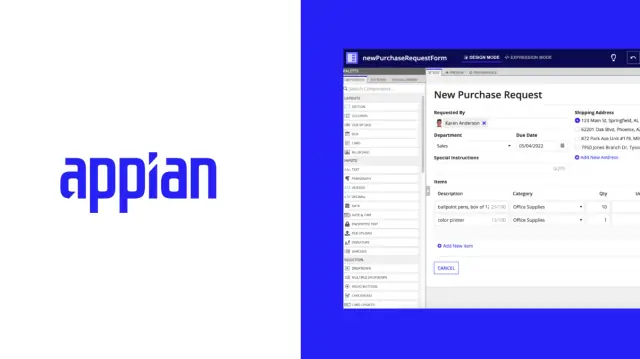Appian
Explore Appian - a low-code platform for efficient app development.

In today's rapidly evolving technological world, where speed and agility are paramount, traditional software development approaches can sometimes hinder progress. This is where low-code platforms like Appian step in, redefining the way applications are built and deployed. Founded in 1999 by Matt Calkins, Appian has grown to become a prominent player in the low-code development space. Its innovative platform empowers organizations to create powerful applications quickly, without the complexities traditionally associated with coding.
How Does Appian Work?
Appian provides a comprehensive low-code development platform enabling organizations to rapidly design, build, and deploy applications. At its core, Appian offers a visual interface that simplifies development. Users can create applications by dragging and dropping components onto the interface, defining data models, and configuring business logic without writing extensive lines of code. This visual approach makes application development more accessible to a wider range of users, including business analysts and subject matter experts, who can actively contribute to the development process.

Appian's platform also boasts an array of pre-built components and integrations, making connecting with existing systems, databases, and APIs easier. This accelerates development timelines and reduces the need for manual coding. Moreover, the platform supports team collaboration, ensuring seamless communication and shared development efforts. Once an application is created, it can be deployed across various devices and platforms, allowing organizations to meet the demands of a diverse user base.
Key Features
- Visual Development: Appian's drag-and-drop interface allows users to build applications visually, reducing the need for manual coding.
- Process Automation: The platform supports workflow automation, streamlining business processes and improving operational efficiency.
- Integration Capabilities: Appian's pre-built connectors facilitate integration with various systems and data sources, ensuring smooth data flow.
- Mobile Support: Applications developed on Appian can be easily deployed to mobile devices, providing users with access on the go.
- Collaboration: The platform supports collaborative development, enabling teams to collaborate seamlessly on application projects.
- Scalability: Appian's architecture is designed to handle the needs of both small-scale projects and large enterprise applications.
- Security: Appian prioritizes data security, offering features such as encryption, access controls, and compliance with industry regulations.
- Analytics: The platform provides built-in analytics tools that allow organizations to gain insights from their applications' data.
Who Can Use Appian?
Appian's low-code platform is designed to cater to a wide range of users with varying levels of technical expertise. Here's a breakdown of who can benefit from using Appian:
- Business Analysts: Individuals with a deep understanding of business processes but limited coding skills can leverage Appian to design and automate workflows, improving operational efficiency.
- Developers: Appian is suitable for both experienced developers and those new to the field. Developers can use the platform to accelerate development, integrate systems, and focus on more complex coding tasks.
- Citizen Developers: Non-technical users, often called "citizen developers," can use Appian's intuitive interface to create applications without writing code. This empowers subject matter experts to contribute directly to application development.
- IT Professionals: Appian provides tools for IT teams to integrate existing systems, ensure security and compliance, and manage the deployment of applications across the organization.
- Enterprises: Appian is well-suited for enterprises seeking to modernize their IT infrastructure, digitize manual processes, and rapidly develop and deploy applications to meet business demands.
- Small and Medium-Sized Businesses: SMBs can benefit from Appian's ability to create applications tailored to their specific needs, providing a competitive edge without requiring extensive coding resources.
- Industries: Appian's flexibility applies to various industries, including financial services, healthcare, manufacturing, retail, and more.
Try AppMaster no-code today!
Platform can build any web, mobile or backend application 10x faster and 3x cheaper
Appian vs. AppMaster
When comparing Appian and AppMaster, two powerful platforms that cater to the application development and automation world, it's essential to delve into their unique strengths and offerings. Both platforms aim to simplify the development process and empower users to create functional and efficient applications. Still, they do so in distinct ways that cater to different needs and objectives.
AppMaster is a dynamic no-code tool offering a unique application development approach. It stands out by enabling users to create front-end interfaces and backend functionality, making it a full-stack development platform. With a focus on generating real applications, AppMaster lets users visually design data models, business logic, and user interfaces for backend, web, and mobile applications.
Unlike some other platforms, AppMaster's applications are not just prototypes or mockups but fully executable applications complete with source code. This feature particularly benefits organizations seeking to reduce technical debt and ensure a scalable and powerful application architecture. AppMaster's ability to generate applications from scratch, compile them, run tests, and deploy them to the cloud or on-premises showcases its dedication to delivering tangible and functional results.
Moreover, AppMaster's support for multiple database systems, stateless backend applications generated with Go, and specialized frameworks for web and mobile applications underscore its focus on performance, scalability, and versatility. Whether an organization needs a scalable backend solution or aims to create interactive web and mobile applications, AppMaster's comprehensive toolset caters to various use cases.
Choosing the Right Fit
The choice between Appian and AppMaster depends on an organization's specific requirements and objectives. Appian excels in automating business processes and integrating data, making useful for organizations looking to enhance operational efficiency and collaboration. On the other hand, AppMaster is a no-code platform that delivers fully functional backend, web, and mobile applications, eliminating technical debt and providing a path to scalability and performance.
The decision should be based on the nature of the projects, the level of control desired, and the intended outcomes. Appian's focus on process automation and integration aligns well with business process optimization, while AppMaster's commitment to real application generation positions it as a comprehensive solution for organizations seeking to develop full-stack applications that deliver tangible value and results.



